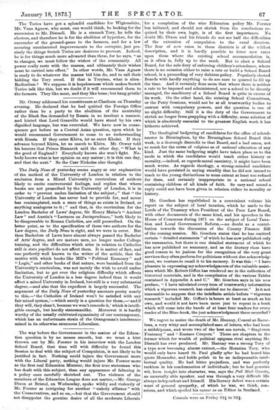The way before the Government in the matter of the
Educa- tion question is by no means smooth, but we trust a hint thrown out by Mr. Forster in his interview with the London School Board, that time will with difficulty be found this Session to deal with the subject of Compulsion, is not likely to be justified in fact. Nothing could injure the Government more with the Liberal party, nothing would injure Mr. Forster more as the first real Education Minister, the first true statesman who has dealt with this subject, than any appearance of faltering in a policy once carefully sketched out. The violence of the members of the Education League does not matter,—Mr. George Dixon at Bristol, on Wednesday, spoke wildly and violently of Mr. Forster as intriguing for another "unholy alliance" with the Conservatives, and so on,—but that the Government should not disappoint the genuine desire of all the moderate Liberals for a completion of the wise Education policy Mr. Forster has initiated, and should not shrink from the conclusions re- quired by their own logic, is of the first importance. No doubt Mr. Dixon and his friends do not see half the difficulties of the extension of compulsion to the rural districts. The fear of new rates in these districts is of the wildest description, and it is hardly possible to force new rates upon them where the existing school accommodation is, as it often is, fully up to the mark. But to elect a School Board, for the sole duty of enforcing children's attendance, where there is no occasion either to raise a rate or build a School Board school, is a proceeding of very dubious policy. Popularly elected Boards with hardly anything to do are sure to quarrel to fill up the time. And it certainly does seem that where there is neither a rate to be imposed and administered, nor a school to be directly managed, the machinery of a School Board is quite in excess of its work. On the other hand, the existing School Committees, or the Petty Sessions, would not be at all trustworthy bodies to entrust with compulsory powers, and the question is one of no alight difficulty. Still it is the duty of the Government to shrink no longer from grappling with a difficulty, some solution of which is absolutely essential to the greatest English work it has hitherto achieved.


































 Previous page
Previous page